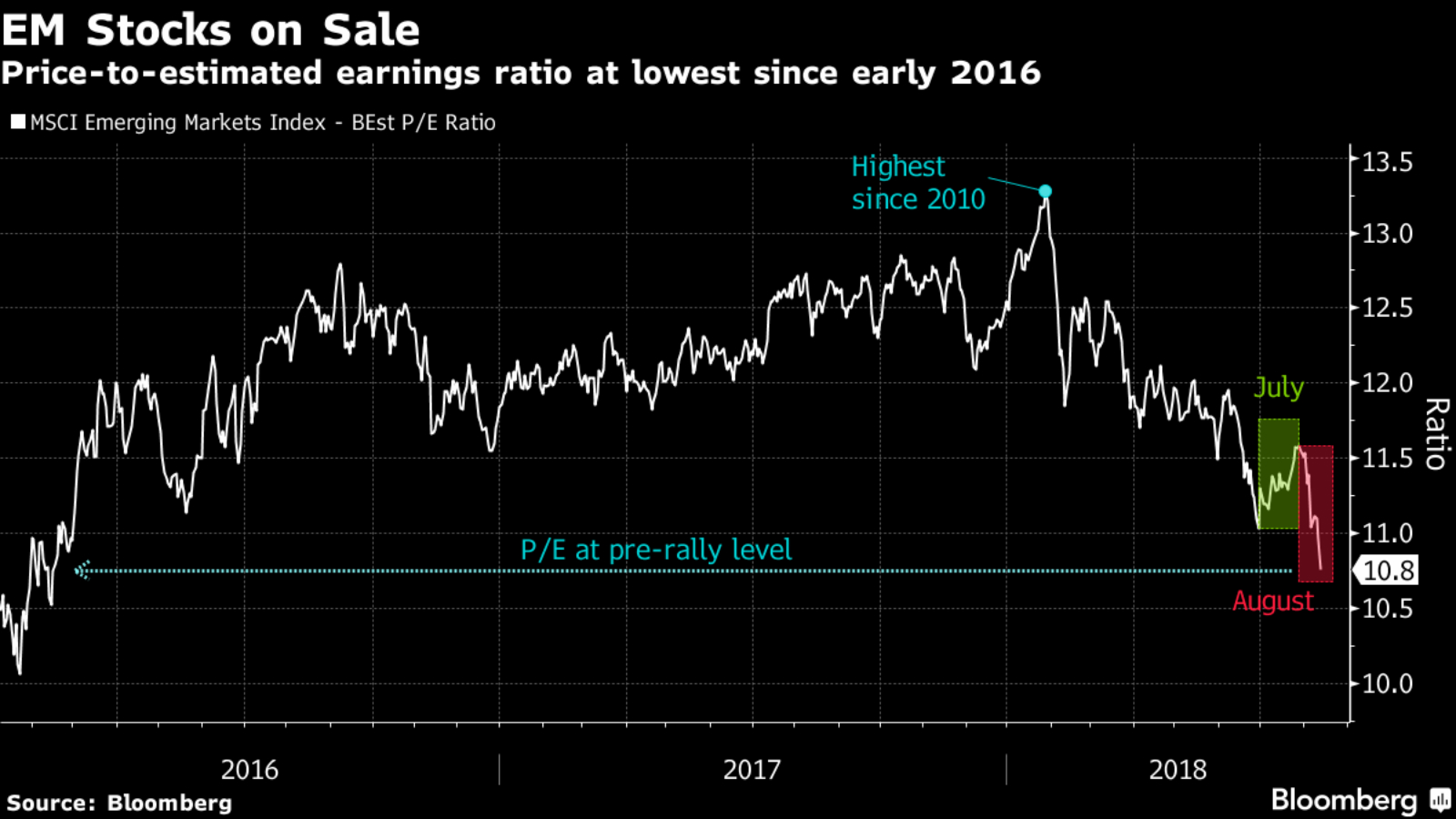Turkey fallout wipes out gains from EM zombie apocalypse rebound

Turkey fallout wipes out gains from EM zombie apocalypse rebound: EM equities and currencies continued to take a beating on “Manic Monday,” with the Turkey fiasco not only erasing the July rebound in emerging-market stocks, but also making them the cheapest since early 2016, when equities gained 60% over the following two-year period, according to Bloomberg. JPMorgan’s EM foreign exchange index fell another 1.7% to a fresh record low, while the FTSE Emerging Markets stock index fell 2%, its worst one-day drop since early February and taking it to near a one-year low, the FT says. Apart from the lira and the Argentinian peso, the South African rand was the hardest hit EM currency.
Fresh new lows from Turkey despite moderate action: Turkey’s lira continued to drop against the USD yesterday, “rattling other emerging markets” as it ended the day 6.6% lower.“The country’s debt and stock markets were also swept up in the turmoil,” says the Wall Street Journal. Ankara’s currency dropped despite Turkish officials’ efforts to “boost liquidity in the market [by] lowering the amount of liras and USDs lenders must park with the central bank against their liabilities” — a move analysts predicted would not “have any direct impact on the lira” since it fails to address the “core concern” that is Turkey’s “hefty debt exposure.” Investors are seeing that anything short of a cooling of tensions with the US and a rate hike by the central bank as a bandaid.
As the crisis intensifies, analysts are filing into their respective camps in the debate over the extent of the contagion:
The harbingers of doom and gloom: Those who see the contagion spreading perceive the Turkey crisis as another domino in a series of events leading up to a perfect storm. Turkey’s financial crisis, coupled with mounting EM debt, shrinking liquidity worldwide as a result of fading monetary easing and a strengthening USD is driving investors to not be forgiving of policy mistakes and perceive risk in a different light, some analysts say. “After ten years of monetary policy anaesthetic, the number of sceptics is growing,” Alberto Gallo at Algebris Investments tells the FT (which has been the voice of EM doom and gloom for the better part of 2018).
The optimists: Others, including JP Morgan, see the crisis as a disaster of Turkey’s own making and investors as smart enough to see the disaster as isolated at a time when EM governments with some sense take active policies to contain their respective crises. “EM has already seen a large selloff between April to July and negative developments in Turkey will eventually be seen (along with Argentina) as isolated given their exceptional external imbalances compared to most EM countries,” JPMorgan analysts including Luis Oganes and Jonny Goulden wrote in note to clients picked up by Bloomberg.
Saudi Arabia appears to have lowered its oil production during July, despite vows less than a month before that it was planning to pump a record 10.8 mn barrels of crude a day under a pact with OPEC to ramp up global production, Anjli Raval writes for the FT. “OPEC’s largest producer pumped just under 10.4 mn bopd last month,” according to OPEC researchers. “This is a fall of more than 52,000 bopd from the prior month.” OPEC’s decision had come at a time when global oil prices had surged above the USD 80/bbl mark.
Musk lining up the ducks for Tesla buyout: Elon Musk confirmed that Saudi Arabia’s Public Investment Fund was interested in funding Musk’s attempts to take Tesla private in a blog post on Monday. In it, Musk revealed that talks with KSA’s sovereign wealth fund for an acquisition of a stake had been taking place over the course of two years, and that the fund’s management “expressed support” for his announcement last week of his intentions to take Tesla private. “Obviously, the Saudi sovereign fund has more than enough capital needed to execute on such a transaction,” Musk said, adding “that it was just a matter of getting the process moving.” The post was meant to explain his tweet announcing the buyout, amid reports that the US Securities and Exchange Commission was investigating the accuracy of his tweet that funding for the buyout was “secured.”
Musk later tweeted that he is working with Goldman Sachs and PE firm Silver Lake on the transaction, giving it further credibility. The Tesla founder and CEO also said that he is currently working with legal advisers on the transaction, which according to his original announcement, would give the company a USD 70 bn valuation.